The Best AI SEO Tools (in 2026)
We analyzed and tested over 80 AI tools for SEO, and these are the most effective platforms for optimizing content, research, and rankings in 2025.
Crafting content that ranks well in search engines requires countless hours of keyword research, competitive analysis, and optimization work. Even experienced SEO professionals struggle to keep up with the constant demands of content planning, creation, and refinement across multiple pages and target keywords.
After testing over 80 AI-powered SEO tools and spending hundreds of hours evaluating their capabilities, we've identified the eight most effective platforms helping teams streamline their SEO workflows in 2025.
Quick look: The 7 best AI SEO Tools
 Writesonic Best for creating versatile marketing contentSee Tool
Writesonic Best for creating versatile marketing contentSee Tool Clearscope Best for optimizing competitive contentSee Tool
Clearscope Best for optimizing competitive contentSee Tool MarketMuse Best for strategic content planningSee Tool
MarketMuse Best for strategic content planningSee Tool
What makes the best AI SEO Tools?
Here's what we evaluated to identify the best AI SEO tools:
- Research Depth: The top tools excel at analyzing search results and competitor content to uncover valuable optimization insights. They provide comprehensive data on keywords, topics, and content structure needed to outrank competitors.
- Content Generation: Quality of AI-generated drafts and optimization suggestions sets leading tools apart. The best platforms create well-structured content that requires minimal editing while maintaining natural readability.
- Workflow Integration: Standout tools seamlessly fit into existing content processes through features like Google Docs integration, WordPress plugins, and collaboration capabilities. Integration with other SEO tools amplifies their effectiveness.
- Customization: Leading platforms provide granular control over AI outputs through features like brand voice training, custom templates, and adjustable content parameters. This level of customization ensures generated content aligns with specific needs.
The best AI SEO Tools at a glance
| Tool | Best For | Standout Features | Pricing |
|---|---|---|---|
| Japser | Creating Brand-Aligned Content | Adaptable Brand Voice training. | Premium plans based on word count. |
| Frase | Generating Content Briefs | Deep question research engine. | Offers $1 trial for 5 days. |
| Writesonic | Creating Versatile Marketing Content | Chatsonic AI with Google data access | Uses credits based on words/quality. |
| Scalenut | Streamlining Content Workflows | Cruise Mode automated content creation. | Credit-based system with paid plans. |
| Clearscope | Optimizing Competitive Content | Sophisticated topical relevance analysis. | Premium pricing starting hundreds monthly. |
| MarketMuse | Strategic Content Planning | Site-wide analysis identifies topic gaps | Premium pricing, often customized for enterprise |
| GrowthBar | Streamlining Blog Creation | Rapid AI blog post generation. | Budget-friendly plans for individuals/teams. |
Best AI SEO Tools for Streamlining Content Workflows
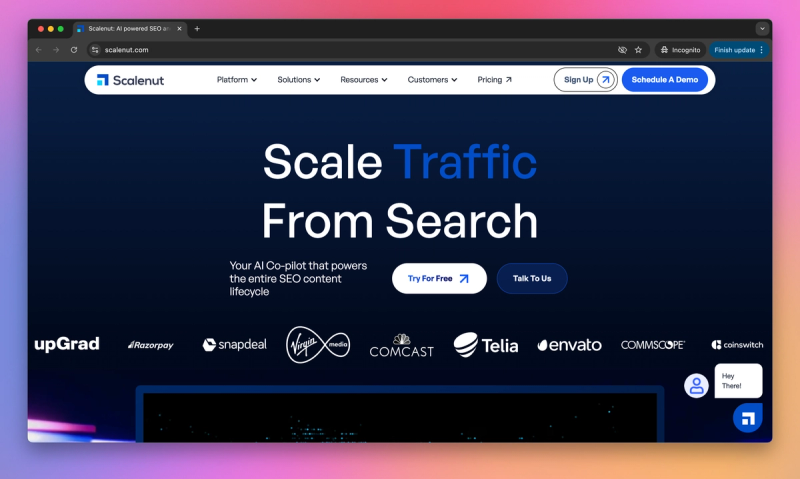
Scalenut
Scalenut serves as an end-to-end platform designed to manage the entire SEO content lifecycle, encompassing planning, research, AI-assisted writing, and optimization. Its core value stems from unifying these distinct content tasks into a single, streamlined workflow. The platform features "Cruise Mode," which automates the generation of comprehensive content briefs and initial drafts by analyzing top-ranking competitor content for a target keyword. It leverages NLP to create detailed briefs and topic clusters, complemented by a real-time editor providing optimization scores as content is developed. Integrated keyword planner tools further support building an overall content strategy within the application.
Pros:
- Integrated Workflow: Having keyword research, SERP analysis, brief generation, AI writing, and optimization in one place is incredibly convenient, saving time and simplifying the content production process.
- High-Quality Briefs: The detailed content briefs, drawing from NLP term analysis and competitor data, provide genuinely helpful guidance for creating comprehensive articles.
- Accessible Interface: Despite the range of features, guided processes like Cruise Mode make adopting sophisticated SEO content techniques feel straightforward, even without deep expertise.
Cons:
- Editing Required: While the AI writer speeds up drafting, the generated content consistently needs substantial human editing to refine factual accuracy, ensure brand voice, and improve flow.
- Restrictive Credits: The credit system used for generating reports and AI words can feel limiting, especially for high-volume needs, potentially disrupting workflows or escalating costs unexpectedly.
- Term Relevance Issues: On occasion, some suggested NLP terms can feel slightly irrelevant or awkwardly forced for certain niches, requiring careful editorial judgment during integration.
Best Use Cases:
- Scaling Content Production: Ideal for in-house content marketing teams and SEO agencies that need a robust system to efficiently scale the creation of high-quality, data-driven content.
- Standardizing Workflows: Excellent if you aim to implement a consistent methodology across your team for researching, creating, and optimizing content based on data.
- Boosting Content Velocity: A strong choice when the goal is to increase the speed of content output while simultaneously improving its potential to rank well for competitive topics.
Best AI SEO Tools for Generating Content Briefs
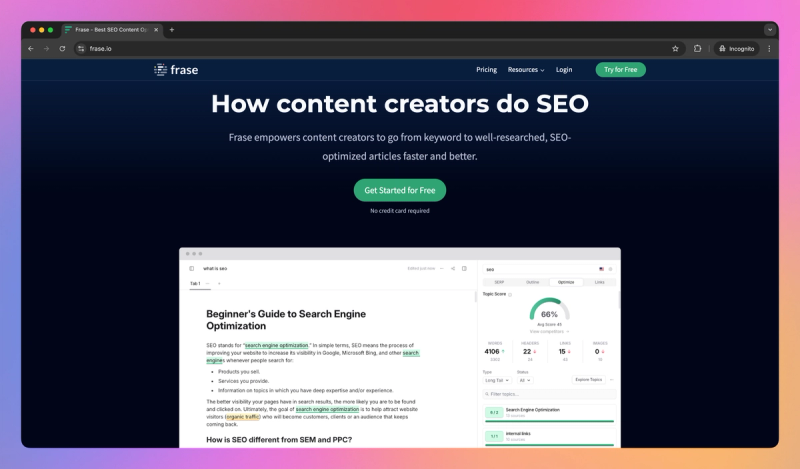
Frase
Frase focuses intensely on the research and outlining stages of SEO content creation, helping creators understand user intent and build comprehensive content briefs faster. Its core value lies in automating the often tedious process of manual SERP analysis, topic discovery, and question research from various online sources. Frase's key differentiator is its deep research engine which pulls data not just from Google but also platforms like Quora and Reddit for a richer understanding. Key features include automated content briefs compiling competitor data and user questions, alongside a dedicated question research tool. This approach enables teams to significantly speed up research and ensure content thoroughly addresses user queries.
Pros:
- Exceptional Research Depth: Its ability to quickly gather and synthesize vast amounts of research from SERPs and online communities is invaluable for understanding user intent.
- Streamlined Briefing Process: Significantly accelerates the creation of detailed content briefs, freeing up time for writing and strategy rather than manual research.
- Actionable Optimization Guidance: The content optimization editor provides clear, topic-focused recommendations reported to improve content scores and rankings.
Cons:
- Inconsistent AI Writer: While helpful assistants, the AI writing tools can produce generic output needing substantial editing for quality and brand voice.
- Dense Interface: With its focus on detailed research data, the interface can feel somewhat overwhelming initially, requiring time to master all features.
- Limited Scope: Focuses heavily on content research, writing, and optimization; requires separate tools for technical site audits or backlink analysis.
Best Use Cases:
- Deep Content Research: Ideal for teams needing thorough SERP analysis and user intent discovery before writing begins.
- Streamlining Briefs: Excellent for efficiently creating comprehensive content outlines for writers tackling complex or competitive topics.
Best AI SEO Tools for Creating Versatile Marketing Content
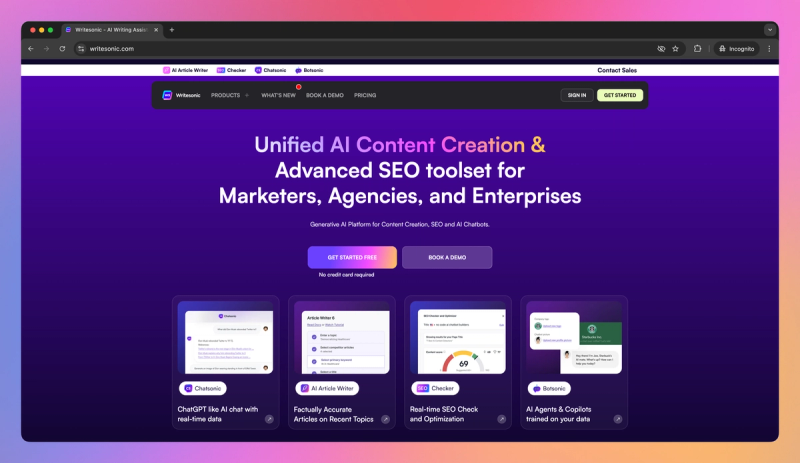
Writesonic
Writesonic acts as a versatile AI writing assistant aimed at marketing and business users needing efficient content generation, including for SEO. It boasts a library of over 100 specialized templates and integrates features like Photosonic for AI images and Chatsonic for AI chat using current Google data. A key component is the AI Article Writer, guiding users through creating structured, long-form content designed to be factual and SEO-aligned. The platform emphasizes a user-friendly interface to make generating diverse content types straightforward. Writesonic aims to provide a comprehensive content creation suite for marketers.
Pros:
- Template Variety: You get access to an extensive library covering almost any marketing need, which really helps kickstart different content formats.
- Ease of Use: The platform feels straightforward with a clean layout, making it simple to start generating content quickly, even without much AI tool experience.
- Up-to-Date Information: Chatsonic's ability to pull current Google data is a big plus for creating timely and factually grounded blog posts or articles.
Cons:
- Inconsistent Quality: While often good, the AI output can sometimes come across as generic or repetitive, meaning you'll likely need to spend time editing for brand voice and depth.
- Fact-Checking Essential: Even with Google data access, you absolutely still need to double-check the facts, as the AI can make mistakes or misunderstand context.
- Confusing Credit System: Managing costs can be tricky with the credit system tied to word count and quality levels; high usage might get expensive quickly.
- Potential Feature Overload: With so many templates and different article writer versions, it can initially feel a bit overwhelming figuring out the best tool for your specific task.
Best Use Cases:
- Scaling Content Production: Excellent for marketers, bloggers, and agencies who need to produce a high volume and wide variety of content formats efficiently across multiple channels.
- Accessible AI Writing: A strong choice if you're newer to AI writing tools and want a user-friendly platform to quickly generate drafts for blogs, ads, and website copy.
Best AI SEO Tools for Creating Brand-Aligned Content
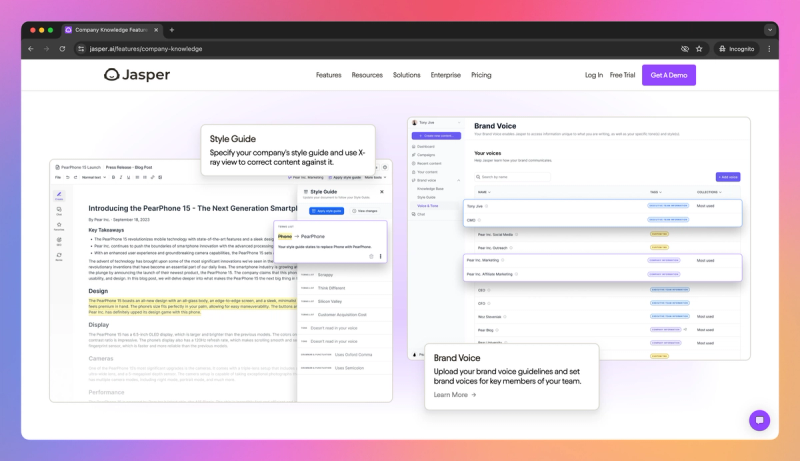
Jasper
Jasper is recognized for generating high-quality, natural-sounding content suitable for various marketing and SEO needs. It emphasizes output quality and brand consistency, allowing users to train the assistant on specific style guides using its Brand Voice feature. The platform includes a flexible Documents editor with command capabilities alongside an extensive template library for different content formats. Users can craft compelling marketing messages, blog posts, and other materials while maintaining a consistent brand presence. An optional integration with Surfer SEO allows for direct content optimization within the editor.
Pros:
- High-Quality Output: Frequently produces natural, creative, and engaging content that often requires less editing time compared to other tools.
- Brand Consistency: The Brand Voice feature is highly effective for training the AI to adopt a specific tone, style, and knowledge base, ensuring brand alignment.
- Flexible Control: Provides significant user control through a combination of specialized templates, a powerful long-form editor, and natural language commands.
Cons:
- Premium Pricing: Positioned as a high-end tool, its subscription plans are generally more expensive, typically based on word generation limits.
- Learning Curve: Achieving optimal results with advanced features like commands and optimizing workflows within the Documents editor requires dedicated learning and practice.
- Requires Fact-Checking: As with any generative tool, outputs must be carefully reviewed for factual accuracy, as inaccuracies can occasionally occur.
Best Use Cases:
- Marketing Copy: Excels at generating creative and persuasive text for advertising, social media posts, and email marketing campaigns.
- Long-Form Content: Efficiently drafts high-quality blog posts, articles, and reports using the adaptable Documents editor and integrated templates.
- Maintaining Brand Voice: Ideal for organizations needing to ensure a consistent tone, style, and factual basis across all generated content.
Best AI SEO Tools for Optimizing Competitive Content
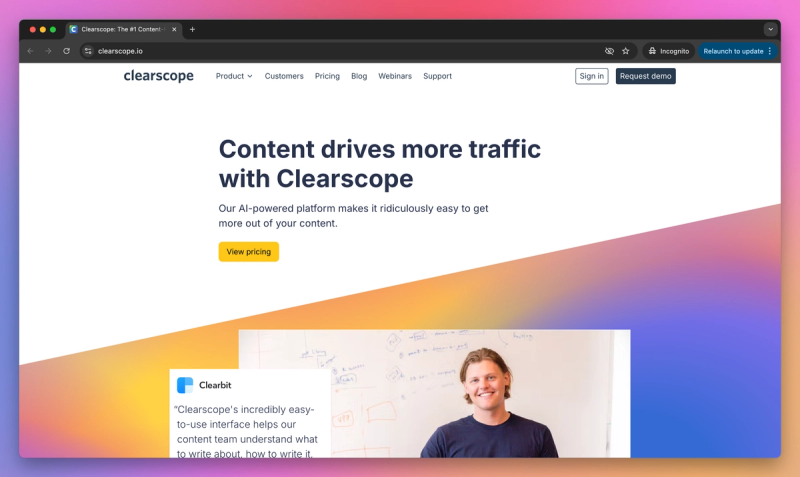
Clearscope
Clearscope is a premium content optimization platform designed specifically to help teams create articles that rank effectively for highly competitive keywords through NLP-driven analysis. Its core function involves analyzing top-ranking search results to provide highly accurate, term-level recommendations that guide writers toward comprehensive topic coverage. Key features include detailed Content Reports that grade content and map term importance, based on analysis of the top 30+ Google results for a target query. The platform offers seamless integrations with Google Docs and WordPress, allowing optimization guidance directly within common writing workflows. Ultimately, Clearscope aims to improve content quality and topical relevance, increasing the probability of achieving high search engine rankings.
Pros:
- Actionable Recommendations: Delivers highly accurate and relevant term suggestions that demonstrably improve content quality and search rankings, especially for competitive topics.
- Topical Depth: Moves beyond simple keyword density to promote true topical comprehensiveness, aligning content with search engine preferences for authoritative information.
- Workflow Integration: Provides valuable Google Docs and WordPress integrations, allowing writers and editors to optimize content efficiently without switching contexts.
Cons:
- Premium Cost: Pricing is significantly higher than many alternatives, potentially making it prohibitive for freelancers, small businesses, or teams with limited budgets.
- Optimization Focus: Primarily concentrates on content refinement and lacks robust AI writing features for generating full drafts; content must be written first.
- Can Be Prescriptive: Following term suggestions too rigidly requires careful editorial judgment to ensure the content remains natural-sounding and maintains flow.
- Requires SEO Knowledge: To extract the most value, you need a foundational understanding of SEO principles; it's less suited for complete beginners compared to simpler tools.
Best Use Cases:
- Competitive Niches: Creating content designed to rank for high-value, competitive keywords where deep topical authority is crucial for success.
- Serious Content Teams: Supporting established content marketing departments, SEO agencies, and large publishers focused on measurable content ROI.
- Refining Existing Content: Auditing and enhancing existing articles to improve their comprehensiveness, topical relevance, and ranking potential.
Best AI SEO Tools for Strategic Content Planning

MarketMuse
MarketMuse operates as a content strategy and intelligence platform, focusing on site-wide analysis for building topical authority. It uses AI to audit entire content libraries, identifying topic gaps, content decay, and strategic opportunities for improvement or creation. The platform generates detailed content briefs based on sophisticated topic modeling, guiding writers to create comprehensive content. Its Content Optimization Editor provides real-time feedback based on how well a draft covers recommended topics from the brief.
Pros:
- Deep strategic insights for content planning
- Sophisticated topic modeling capabilities
- Comprehensive content gap analysis
Cons:
- Steep learning curve
- Higher pricing than simpler tools
- Limited AI writing features
Best Use Cases:
- Enterprise-level content strategy development
- Comprehensive content audits
- Creating detailed writer briefs
Best AI SEO Tools for Streamlining Blog Creation
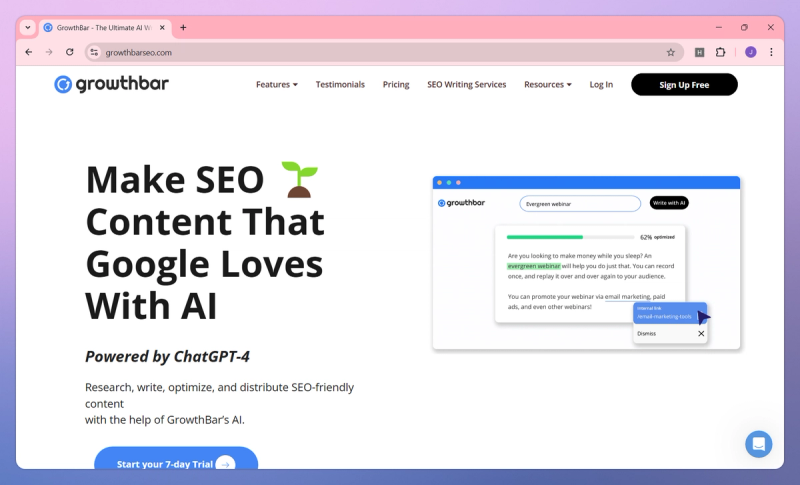
GrowthBar
GrowthBar offers a streamlined approach for bloggers and marketers needing to quickly research keywords and generate SEO-optimized blog content. It emphasizes simplicity and speed, distinguishing itself from platforms focused on deep, granular analysis. The platform's core features include an AI Blog Post Outline & Generator that rapidly creates drafts from keywords, alongside tools for keyword research and basic competitor analysis. GrowthBar also provides content optimization suggestions within its editor to help refine the initial AI output. Its main appeal lies in accelerating the content production pipeline for users prioritizing velocity.
Pros:
- Speed and Ease of Use: GrowthBar is highly regarded for its simple interface and the rapid pace at which it generates blog outlines and initial drafts, making it accessible with minimal learning.
- Focused Workflow: It effectively integrates keyword research, competitor snapshots, outline creation, AI writing, and basic optimization checks into a straightforward process tailored for blog content.
- Affordability: Compared to more comprehensive SEO suites, its pricing is generally more budget-friendly, appealing to individuals and smaller teams.
Cons:
- Requires Editing: The AI-generated content serves as a first draft and typically needs considerable editing for factual accuracy, depth, unique voice, and overall polish before publication.
- Superficial Analysis: The insights from keyword research, competitor analysis, and optimization suggestions are less detailed than those found in more specialized or premium SEO platforms.
- Blogging Focus: The tool's functionality is heavily centered on blog post creation, lacking features for technical SEO, in-depth backlink analysis, or broader strategic planning.
Best Use Cases:
- Rapid Draft Generation: Quickly creating initial blog post outlines and full first drafts to overcome writer's block and accelerate the content pipeline.
- Simplified Content Workflow: Bloggers and small teams seeking an easy-to-use tool that combines basic keyword research and AI writing assistance without complex features.
- High-Velocity Blogging: Users who prioritize publishing frequency and need a tool to efficiently produce a large volume of blog content starters.
Conclusion
Modern AI SEO tools dramatically reduce the time spent on research, content planning, and optimization - but they're aids, not replacements for human expertise. Tools like Scalenut, Clearscope, and MarketMuse help teams work faster and smarter by automating repetitive tasks and providing data-driven insights. When used strategically, they enable organizations to scale content production while maintaining quality standards.



